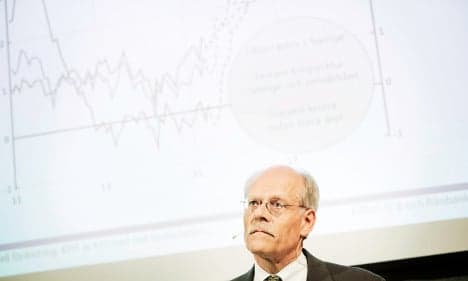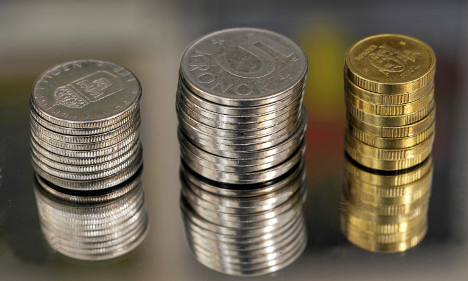Sweden keeps record negative interest rate

UPDATED: Sweden's central bank (the Riksbank) is keeping its key interest rate, the repo, at a record low of -0.35 percent.
There had been speculation that the rate would be cut, but the bank ruled this out for the time being while indicating that it remained a consideration for the future.
However, it suggested that the rate could fall to -0.40 or 0.45 percent later in the autumn.
The Riksbank is hoping that its financial strategy will boost inflation in order to raise the price of everyday goods and services in Sweden which have been stagnant for two years. It is argued that this in turn will improve the country's economic prospects.
"Our assessment is that inflation will rise to two percent in the course of 2016. But at the same time, one must remember that this is happening in an uncertain world....Therefore we are very ready to do more if we feel we need to do so," Riksbank head Stefan Ingves said at a press conference.
Ahead of nationwide union-led wage negotiations this autumn, the Riksbank also suggested that average salary rises of just over three percent were needed across Sweden in order for the country to reach its inflation target, a figure which is causing concern among some employers.
Carl Eckerdal, chief economist at Livsmedelsföretagen (the Swedish Food Federation), which has over 50,000 employees, accused the bank of making "questionable projections" about productivity and the global economy.
But Torbjörn Johansson, who is set to lead negotiations for The Swedish Trade Union Confederation said he had no objection to the Riksbank's financial assessment.
"It's normal. They're supposed to monitor inflation," he told the TT news agency.

Swedish kronor. Photo: Bertil Ericsson/TT
The Riksbank first slashed interest rates below zero in February in a landmark decision. It continued to cut rates in subsequent months, with the -0.35 rate introduced in July.
Negative rates work differently to positive interest ones. Instead of borrowers paying interest to banks who lend them money and savers expecting to earn interest on their cash, banks have to pay to lend money or make an investment.
The basic idea behind negative rates is to stop organisations or people from making risky investments or transactions that could impact on the wider economy.
Thursday's decision to hold the repo at -0.35 is bad news for savers in Sweden who will continue to see no return on any nest eggs stashed in basic savings accounts.
However, those wishing to borrow money to buy properties or shares will continue to benefit from the record low rates.
Sweden is also continuing with its version of quantitive easing, a bond buying programme, which in simple terms involves borrowing money to inject back into the economy.
The krona strengthened against both the euro and the dollar after the rate announcement, while market rates rose slightly.
Against the euro, the krona rose by about five cents, while the rate against the dollar strengthened 3 to 4 cents.
Comments
See Also
There had been speculation that the rate would be cut, but the bank ruled this out for the time being while indicating that it remained a consideration for the future.
However, it suggested that the rate could fall to -0.40 or 0.45 percent later in the autumn.
The Riksbank is hoping that its financial strategy will boost inflation in order to raise the price of everyday goods and services in Sweden which have been stagnant for two years. It is argued that this in turn will improve the country's economic prospects.
"Our assessment is that inflation will rise to two percent in the course of 2016. But at the same time, one must remember that this is happening in an uncertain world....Therefore we are very ready to do more if we feel we need to do so," Riksbank head Stefan Ingves said at a press conference.
Ahead of nationwide union-led wage negotiations this autumn, the Riksbank also suggested that average salary rises of just over three percent were needed across Sweden in order for the country to reach its inflation target, a figure which is causing concern among some employers.
Carl Eckerdal, chief economist at Livsmedelsföretagen (the Swedish Food Federation), which has over 50,000 employees, accused the bank of making "questionable projections" about productivity and the global economy.
But Torbjörn Johansson, who is set to lead negotiations for The Swedish Trade Union Confederation said he had no objection to the Riksbank's financial assessment.
"It's normal. They're supposed to monitor inflation," he told the TT news agency.
Swedish kronor. Photo: Bertil Ericsson/TT
The Riksbank first slashed interest rates below zero in February in a landmark decision. It continued to cut rates in subsequent months, with the -0.35 rate introduced in July.
Negative rates work differently to positive interest ones. Instead of borrowers paying interest to banks who lend them money and savers expecting to earn interest on their cash, banks have to pay to lend money or make an investment.
The basic idea behind negative rates is to stop organisations or people from making risky investments or transactions that could impact on the wider economy.
Thursday's decision to hold the repo at -0.35 is bad news for savers in Sweden who will continue to see no return on any nest eggs stashed in basic savings accounts.
However, those wishing to borrow money to buy properties or shares will continue to benefit from the record low rates.
Sweden is also continuing with its version of quantitive easing, a bond buying programme, which in simple terms involves borrowing money to inject back into the economy.
The krona strengthened against both the euro and the dollar after the rate announcement, while market rates rose slightly.
Against the euro, the krona rose by about five cents, while the rate against the dollar strengthened 3 to 4 cents.
Join the conversation in our comments section below. Share your own views and experience and if you have a question or suggestion for our journalists then email us at [email protected].
Please keep comments civil, constructive and on topic – and make sure to read our terms of use before getting involved.
Please log in here to leave a comment.